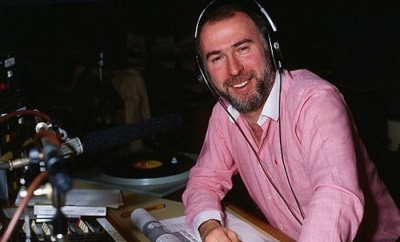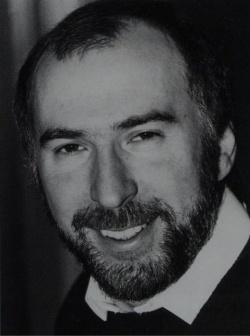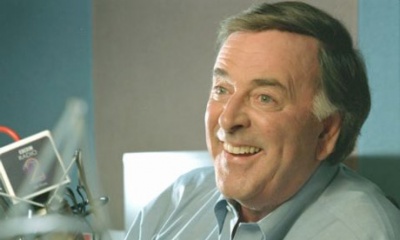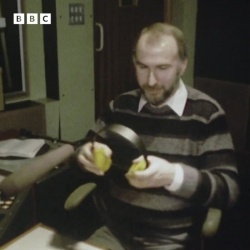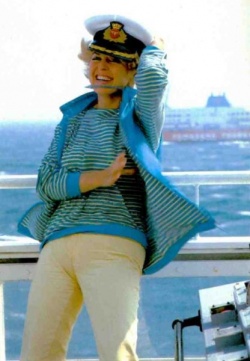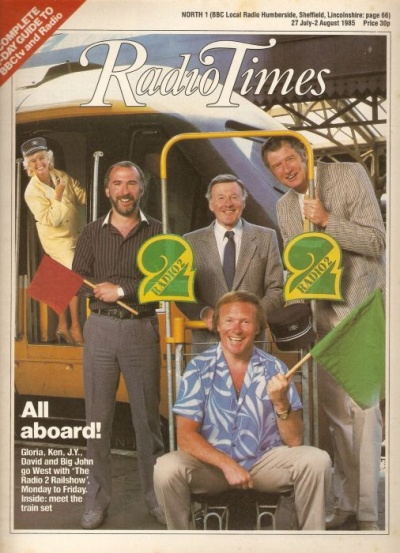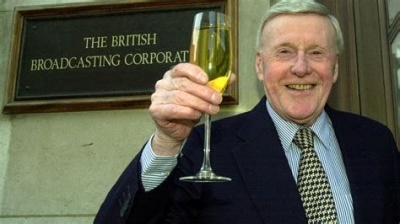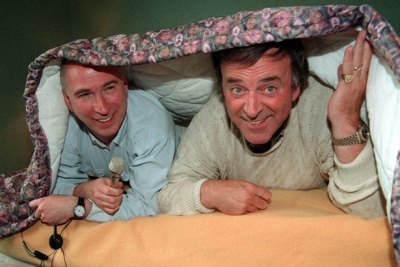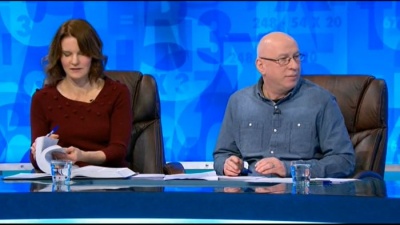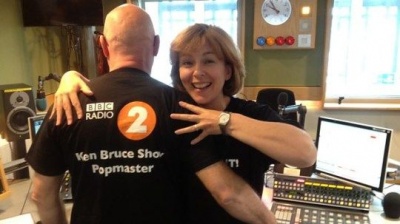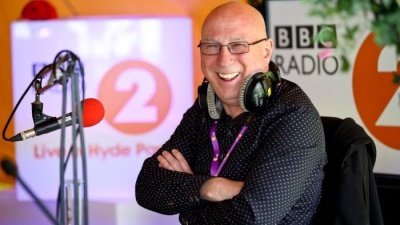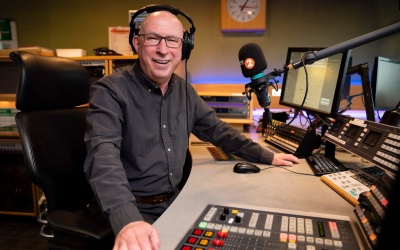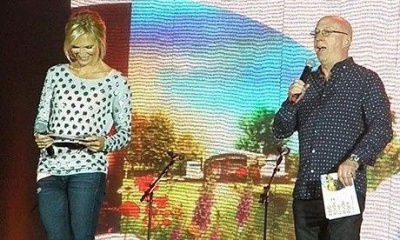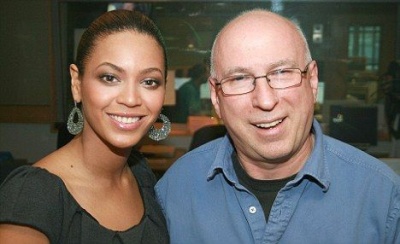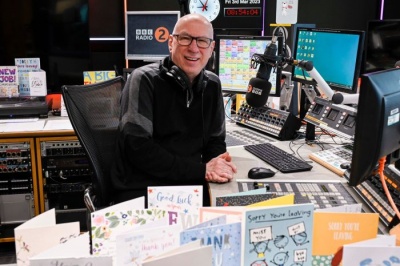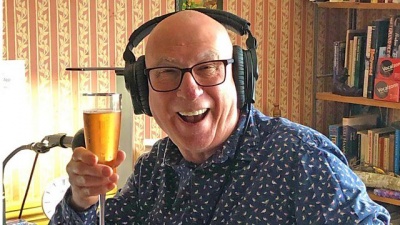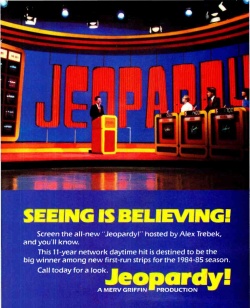Weaver's Week 2023-03-05
Last week | Weaver's Week Index | Next week
One of the most lovely and beloved and hard-working presenters left the BBC last Friday. Whatever will the loyal audience do without Richie Driss, a top-quality Blue Peter presenter who leaves very big shoes to fill.
Earlier in the day, another legend stepped away from the corporation. On the occasion of his retirement from Radio 2, we profile
Contents |
Ken Bruce
"That bloke who was on the radio, he was sorta OK."
Kenneth Robertson Bruce was born on 2 February 1951 in Orchard Park Nursing Home, Giffnock; now the Orchard Park Hotel. He was the youngest of four children. Educated at Hutchesons' Boys' Grammar School, Ken was no good at rugby, better at cricket scoring than batting or bowling. He was appointed captain of the curling team, and named "Laziest boy in the school".
After getting "decent" qualifications, Ken then trained as a chartered accountant, but found that accounting for charters was really really really dull. Even duller than his first record, weepie "I remember you" by Frank Ifield. Moving to Mitchell Self Drive Car Hire, Ken also auditioned for army radio BFBS. They didn't take him on, but saw lots of natural talent, and suggested he volunteer at the Hospital Broadcasting Service, where patients in Glasgow's many hospitals were a ready audience for a young man with delusions of adequacy. Ken proved adequate enough to be taken on by the BBC in 1976.
Being one of the youngest people on Radio Scotland, Ken was given the youth programme Nightbeat, "music and chat for your late night entertainment". He also had a mainstream show on Saturday mornings, and moved to weekday mornings in 1980. It was a broad show, described as "news and interviews, music to suit all tastes, a look at the gardener's world, information for the traveller and a guide to what’s on in Scotland".
Ken presented the Sunday morning show Beat the Band, starring the Bernard Sumner Quartet. Listeners would phone in and challenge the band to play a tune they wanted. If the band didn't know it, the listener got a £4 reward. Very precise, that. Four quid. Not five. Four. The show developed a cult following, mostly as a hangover cure.
Wanting to move to the bright lights of London, Ken met with David Hatch Of The BBC, who was Radio 2's controller. Mr. Hatch Of The BBC liked what he heard, and got Ken in to cover the early show. On his first day, breakfast host Terry Wogan's alarm clock didn't work, and Wogan was late into the studio. Ken Bruce covered for an hour, already sounding like a seasoned pro. When we profile Scott Mills in some year's time, we'll have a similar anecdote.
Ken got some more "deps" – cover for absent presenters – and in 1984 Ken took over the late Saturday night show on Radio 2. "A selection of music for your listening pleasure", the anodyne billing. Fans of Pete Murray's Late Show were not amused, and would doubtless have sounded off on nitter had social media yet been invented. Ken also kept his daily show on Radio Scotland, so got very familiar with the journey from Broadcasting House to Glasgow.
Change at Radio 2 always takes a long time, the station believes in evolution not revolution. By Radio 2's standards, Ken Bruce's rise was almost meteoric. 1984 on Saturday late nights, deps for Steve Jones at lunchtime, for John Dunn at teatime. He's a talent on the rise.
Then Terry Wogan was made an offer he couldn't refuse, and a television chat show to go with it. He left Radio 2 breakfast at the end of 1984. There had been much speculation about who would replace Terry Wogan. "Diddy" David Hamilton was the favourite, early show host Ray Moore was in the frame, as was Michael Aspel from the independent sector. But Ken Bruce? What is Radio 2 thinking of?
As it turned out, this was a poisoned chalice. Radio 2's "breakfast" show of 1985 was an odd beast – Ray Moore presented "the early show" from 6am, and Ken's programme didn't start until 8am. Running for two-and-a-half hours until Jimmy Young at 10.30, Ken had a charming and witty little programme. Regular features included "the daily Drop Me a Line competition", about which we know nothing more. (By the by, we've recently had a letter telling us about A Question of Degree, which we think was a university quiz on Radio Scotland in the mid-to-late 80s. If anyone knows more about this, do get in touch.)
Ken's breakfast show suffered from two problems. 1) He's not Terry Wogan, 2) Management wasn't on his side. Whoever was to replace Wogan was always going to have a hard start, they would rub against that segment of the audience who had grown accustomed to the genial Irishman over the past decade and didn't want anyone different. And Ken Bruce is a different broadcaster: intelligent and witty and concise, not Wogan's slice-of-life blarney. Ken Bruce is not likely to crash the pips.
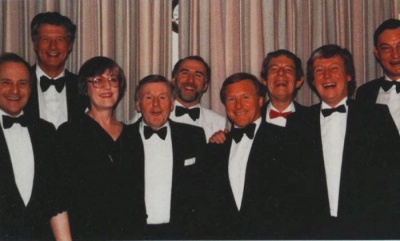 Radio 2's presenters and managers in 1986: David Jacobs, John Dunn, assistant controller Frances Line, Jimmy Young, Ken Bruce, David Hamilton, Derek Jameson, assistant controller David Treadway, controller Bryant Marriott.
Radio 2's presenters and managers in 1986: David Jacobs, John Dunn, assistant controller Frances Line, Jimmy Young, Ken Bruce, David Hamilton, Derek Jameson, assistant controller David Treadway, controller Bryant Marriott.
Behind the scenes, there was trouble. Radio 2 was a troubled ship in 1985. The new controller Bryant Marriott had his ideas about the station, but his staff moulded it to their tastes. Francis Line was appointed Head of Music, and repositioned Radio 2. No longer would it be Radio 1 For Fortysomethings, with a mixture of current hits and oldies. The new Radio 2 chased after the over-55 audience with lots of nostalgia and melody, and hardly any contemporary music. David Hamilton couldn't stomach the changes, and resigned from the station in high dudgeon at the end of 1986, taking The Music Game with him.
History has shown that Francis Line's music policy was a disaster for BBC radio. Not particularly bad for Radio 2, which carved out a clear niche as somewhere for the over 55s. But the choice abandoned the middle-aged market to Radio 1. And that meant Radio 1 became far too old, playing hits from the 60s and 70s well into the 90s. Smashie and Nicey should have hopped across to Radio 2 years before.
Not until the mid-90s would Matthew Bannister have the courage to grasp the nettle and reclaim Radio 1 for the youth. His radical surgery was only necessary because Radio 2 had scorched the earth between the stations. Not until the late 90s, when Francis Line had left the controller's chair, would Radio 2 return to a more balanced music policy, mixing new and old tunes in a companionable manner. The sound of Radio 2 in 2023 is similar to the sound of Radio 2 in 1985.
Ken Bruce's breakfast show was a fallout from this internal struggle. There wasn't much love from senior management, almost as if he'd been set up to fail. For instance, Ken wasn't allowed to rifle through the newspapers for interesting stories. Apparently, this would spike Gloria Hunniford's guns, because she also reads bits out from the press.
However good Ken's breakfast shows were (and – from the extracts we've heard – they were a lot better than contemporary press reports suggest), the fashion just wasn't with him. Derek Jameson was appointed to Radio 2's breakfast show from Easter 1986, complete with a subscription to all the "news"papers. Ken Bruce moved to 9.30. It was a requests and dedications show, the only one on daytime Radio 2. Ken built up a community who let each other into the high points of their lives. Birthdays, wedding anniversaries, people remembering their lost ones. Like Anne Nightingale on Radio 1, Ken cultivated a dedicated following: request shows are fertile ground to build a strong relationship with the listener, and great DJs will make it feel natural. 1.8 million listeners tuned in on an average day.
Radio 2 is a station for older people. Ken wasn't just speaking to his age group, people going through his stage of life. There were lots of older listeners, who will look back on Ken's parenting traps with nostalgia. There will be younger people, hearing someone talk like their parents. And, yes, folk who are also parenting their children.
Ken was allowed to leave the studio from time to time – he joined Radio 2's many day trips – to the Ark Royal, canals, air displays – and took his whole show to the games in Edinburgh and Seoul. Back in 1988, Radio 2 still hosted the sport, and presenters like Ken would move effortlessly from Lonnie Donnegan to Linford Christie.
As part of a "schedule refresh", Ken moved to late evenings in 1990. The show inevitably wittered about what's in the "news"papers – a staple of late evening shows until the last few years. The programme asked listeners for their amazing coincidences, and featured radio bloopers from Jonathan Hewat. There was a late-night story, read by an actor – less involved than A Book at Bedtime on Radio 4, less accessible than Radio 5's bedtime story a few hours earlier.
But Ken Bruce isn't an evenings person, his body clock says "Mornings!" By 1991, he'd swapped shifts with Chris Stuart, and was back on the early show. And in 1992, Ken Bruce moved into the mid-morning programme, where he's been as immovable as granite. Ken also hosted travel programme Breakaway on Radio 4, and a fortnightly programme of album music in the BBC World Service. Ken spent thirty years introducing Friday Night is Music Night, a programme of live music for everybody.
Ken Bruce's other game shows
We've not managed to find more than a short clip of The ABC Quiz. On this radio show, three contestants tried to find the right answer to sound charades from a choice of three. Neville Teller devised this entertainment, wrote the questions, and produced most shows. The star prize was a Walkman and a signed picture of Jimmy Young. Defeated contestants got a walk and two signed pictures of Jimmy Young.
Ken turned down a pop quiz for TVS in 1985, devised by Jeremy Beadle and produced by John Kaye Cooper – both very respected names in their fields.
We mentioned Ray Moore as a possible breakfast show host. It would never happen. Mouth cancer would force Ray off air early in 1988, and claim his life a year later. Ken inherited two gigs from Ray. One was Radio 2's coverage of the Eurovision Song Contest, which he saw as being a commentary of what's happening on stage. It's intended for someone in the kitchen, preparing snacks or opening the next bottle and didn't want to miss too much. It's at least as well-prepared as the television commentary, and equally wearied by the BBC's many failures.
Ken also took over Pop Score, one of those panel games where correct answers were less important than the banter and anecdotes. The show had been running for 20 years when it came off air in 1992, always seemed to ask about The Searchers, The Seekers, Question Mark and The Mysterions, but never Archimedes & Ulrika.
The show is best remembered for its running bonus round. Each point earned a letter towards a song title, which the teams could guess for bonus points, but an incorrect guess would cost points. A light and entertaining listen, Phil Swern gave Ken a few surprising facts to sneak in, often at the expense of captains Alan Freeman and Helen Shapiro.
Radio 2 stopped making these light entertainment panel games in the early 1990s, since when Ken has only appeared as a contestant on shows like Pointless Celebrities and Big Star's Little Star, and a regular dictionary corner guest on Countdown. He gave the commentary for BBC1's one-series wonder Reflex, his only game show credit this century.
Apart from the big one.
Popmaster
We said earlier that Ken Bruce returned to Radio 2's midmorning show in 1992. The main feature on these early mid-morning shows was Pick of the Hits, based on letters and faxes from listeners. Letters and faxes; in 1992 (and even in 1996) email was not widespread. Ken doesn't like too many features in his shows, he prefers the sense of freedom from saying whatever comes into his head.
Schedule tinkering meant that Ken's show gained an extra half-hour in February 1998, with new features. "Sorry" just after 10 was an apology on behalf of a listener. "The Headline Hunt" in the final hour may have been "here's a story from the headlines, what's a suitably snarky song to play", but we think we're confusing that with someone else's feature.
Neither of these lasted too long – "Sorry" became "Love Songs" circa 2003, "Tracks of my Years" arrived in 2000. "Tracks of my years" is a daily feature, across the week a famous person explains ten records of importance in their life. Ken doesn't interrogate like on Desert Island Discs, he helps the person bring out their story; he also asks the questions a listener might ask, such as "when can we see you in concert?"
One of 1998's new features did have legs. It might run for 13 or 26 weeks, maybe a little longer. And it was based on a weakness elsewhere in the schedule. Ed Stewart's afternoon show had The Accumulator Quiz, but it was poor quality. Almost every week, they had to apologise for getting something wrong.
Popmaster would be different, in that it would be absolutely solid, every question would be precise and accurate. To make the feature happen, Ken brought up the line to Phil Swern. The self-proclaimed "Doctor Pop" had worked with Ken on Pop Score, and had already devised The Music Game for David Hamilton on Radio 2 – later heard on independent radio. Phil would do the research, he'd be sure to be accurate.
The format was hammered out over lunch and a couple of bottles of wine, and promptly forgotten the next morning when everyone had sobered up. So they went out for another lunch and some more wine, wrote down the format, and the rest is history. Including the trademark – Ken, Phil, and producer Colin Martin own the format of Popmaster, didn't sign it over to the BBC after the Bake Off kerfuffle, and that's why radio's biggest quiz can transfer to Ken's new station.
Popmaster was intended as "a University Challenge of pop music". It's difficult to win, but not impossible, and anyone who gets 39 is rightly lauded. Over the years, they've tried to fiddle about with it – split the contest into two halves an hour apart, pass questions over, have a teams version. All these changes were abandoned in short order. Champions come back at the end of the year, with question one for one point, two for two, and so on up to ten for ten. Points can quickly accumulate!
They've dumped an "electronic coin" to decide who goes first. The main change has been in the bonuses – originally choosing one question for double points, then around 2002 to a choice of three bonus topics, reduced to two around 2005. Regular bonus rounds include Eurovision (questions mostly cover the time before Ken started commentating in 1988), "Real Names" (by which they mean "birth names"), Once at One, American Hits, and "Same Title Different Song".
The questions themselves are set in themes, from individual years to "cars", via David Bowie and "songs Wogan played", mostly via The Boomtown Rats. A giant grid helps to ensure they ask similar questions to both contestants, but don't return to a topic too often. Except The Boomtown Rats. Popmaster is constrained only by the limits of the question-setters' imagination, and particularly attentive listeners can recognise the topics and areas the question-setters don't know about. The general aim is never to repeat a question, although some facts will come back around after many years.
The style of question has changed over the years. As late as 2007, questions would include "Did that song appear on the album 'Good', 'Bad', or 'Ugly'?" Too confusing for listeners, perhaps too much for players. These days, we'll occasionally get "put these three songs in order", which is complex enough. Popmaster has always struggled to be crisp: Phil Swern and his team have always preferred accuracy over shorter questions, and sometimes forget that it's a radio quiz where we don't see the questions written down.
We'll always cheer for a tiebreak. Particularly when they go on for ages. Particularly particulary when they threaten to go on so long that Jeremy Vine might lose some of his airtime. We don't particularly want to hear people get questions wrong for hours on end, but it is better than the alternative.
Popmaster continued and continued and continued; without anyone planning, it became an appointment to listen. Does your job schedule meetings at 10.30? Then someone is a blighter. For many years, Ken would fill the gap between the two halves with his "Record of the Week". He became tired of people who took forever to give their hellos, moved them to after they'd played, and eventually imposed a 30-second limit.
Popmaster's success is, in part, a product of music being relatively stable since rock 'n' roll. If Popmaster had been on Radio 2 in 1980, it would span everything from Blondie through The Beatles and skiffle, back to ragtime and the musicals of George and Ira Gershwin. Today's Popmaster has a common heritage, everything before rock 'n' roll is Too Obscure, the works of Cliff Richard and Madonna and Reg Snipton and Taylor Swift are common currency. During his time on the station, Radio 2 has made the same change.
By being around every day for a quarter of a century, Popmaster has become popular. Very popular. Ken's show as a whole attracted 8.7 million listeners per week during 2021, about 3.2 million a week in the 10.30 quarter-hour. We reckon that Popmaster got about 2.5 million listeners every single day. That is huge; in the summer, it's often the most popular quiz on television or radio. The Chase can regularly get more viewers, Pointless sometimes, House of Games and Tipping Point on a very good day. Popmaster gets the popular vote every single day.
Why the long song immediately afterwards? You've just listened to 20 minutes of talking, it gives a bit of variety into the show. Ken doesn't want to bore people, he always keeps moving, and knows when it's best not to speak. And, yes, sometimes it gives Ken a chance to nip to the little DJ's booth. "Ken Bruce Music" is almost a style: laidback soft rock, he'll get at least one track onto every show.
Ken respects the music, he won't talk too long over the beginning or end of a track, and will often say something about the song we've just heard. He's got a keen ear for obscure music: for many years, he'd dig out "A Christmas song" by Shaun Phillips, a 1972 release we'd hear nowhere else. The indie group Saint Etienne were also fans, and got Ken to record vocals on their 2017 album "Home Counties". Popmaster has seen off many affectionate tributes – name that aria contest "Opmaster" lasted one day on Scala Radio before changing its name, while 6 Music's Jon Holmes dreamed up "Ken Bruce Master".
Ken's held in high esteem by other radio presenters, too. When Radio 2's studios were being refurbished, he broadcast from Radio 1's hip and happening studios. Wowfabgroovy jocks like Nick Grimshaw and Adot and Greg James queued up for selfies with their hero.
Ken has six children from his three marriages, meeting his third wife at Eurovision 1998. One of the sons from his current marriage is autistic, and that's led Ken to support the Autistica charity, which does research into the causes of this different way of thinking and offers practical advice for all.
Listen more
Andy Walmsley has written a guide to Ken's career with plenty of full shows embedded.
The show from 2 October 2007, when phone-in contests were banned and they had to get celebrities to play Popmaster.
From 11 August 2016, one of many editions on archive.org from around that time.
"You carry on still working at it until the day you give up"
All good things come to an end. After 43 years broadcasting to the nation, Ken's decided to draw down his pension. But he won't be spending that much more time with his collection of vintage buses, co-owned with Alan Dedicoat and Steve Madden.
Ken will continue to broadcast on "Greatest Hits Radio", a syndicated national station. Much ink was spilled last weekend when we all found Ken's final show was earlier than expected. That's down to Greatest Hits Radio, who have been promoting themselves as "the new home of Ken Bruce" as though Simon Mayo and Andy Crane weren't quality presenters in their own right.
As a radio station, Greatest Hits Radio reminds us of Wetherspoons' pubs – the people we meet are dedicated and do a fabulous job, and we're served something perfectly edible, but the menu is very limited, every establishment feels the same and could be anywhere, and this column gets a nasty feeling that the chain's senior management doesn't share our values.
Ken Bruce has a magic ability. He can sit in front of a microphone, without a script, and be totally natural. Funny. Companionable. Reliable. Welcoming. Ken can do that one day, and the next, and the next. He was the voice behind the mike, solid and dependable. He didn't want to follow Wogan into soft sofas, or Kenny Everett into anarchy, or David Hamilton into irrelevance. Ken just wanted to talk, communicate, entertain by being himself.
Through gentle force of personality, through the sheer persistence of being there and being charming, Ken has built a huge audience, person by person. Ken Bruce has done it by being a friend every single time.
In other news
More treachery! Claudia Winkleman is bringing back The Traitors, everyone's favourite show about people gadding about in hoodies and getting billets-doux at the breakfast table. Series two will again be made by Studio Lambert.
Why is Jeopardy!? The long-running Sony Pictures Entertainment show is coming back to ITV. Its "gimmick" is that all the questions are framed as answers, inviting contestants to give their answers in a facsimile of a question. Stephen Fry will host the show, scheduled for 20 hour-long episodes on the ITV network.
Steve Jones (the one with the big specs, the one who Ken Bruce depped for in 1984) hosted two series in the early 1990s, after which the programme was rightly exiled to the depths of satellite television. They love Jeopardy! in North America. Much of that love comes from the long-serving host, Alex Trebek (who we profiled in two parts). Stephen Fry is not Alex Trebek.
Some of the love comes from the show's brevity, the main programme runs for just 20 minutes, with barely enough time for a few words with the contestants. Even by extending it with Triple Jeopardy!, we fear the show will have a painful amount of filler. Watch Dutch Lingo, then ITV's much slower programme.
And much of the love comes from how Jeopardy! is North America's only regular show rewarding knowledge that wouldn't fit on the back of a postage stamp. Over here, we have Only Connect and University Challenge and Mastermind and we have The Chase and Pointless and Bridge of Lies and One Question and Popmaster and many many many more. Whisper Television are making the show, and we hope Jeopardy! is a hit. We will go into the show with some trepidation.
Incidentally, we note that Jeopardy! and Stephen Mulhern's Deal or No Deal with Stephen Mulhern have both been commissioned for month-long runs. Do ITV plan to make changes in the 5pm slot? Are they nuts?!
This week's Quizzers Digest
- "Speak softly and carry a big stick" was the policy of "Teddy" Theodore Roosevelt. His veep, Charles W Fairbanks, thought this policy most bodacious. (Mastermind)
- A contestant on Only Connect turned up to a birthday party as a box from Deal or No Deal Without Stephen Mulhern. What an excellent shape for a party.
Quizzy Mondays
Crustaceans book their place in the Only Connect final, trouncing the Scrummagers. Translations of cloud formations, people who burned books, a complicated sequence about book titles, women in space, ranks of Tom. It was point after point after point, helped by the Scrummagers getting so close but never quite right. We'll meet the Scrummagers in next week's Third Place Playoff.
Mark Rogers won Mastermind, a perfect round on Universal's Frankenstein movies allowed him to reach 24 in total. He really enjoyed watching the films again.
For the second week in a row, Durham won University Challenge. Southampton pushed them all the way, early and accurate buzzing was the only way to beat Durham, and Southampton got a lot of early buzzing, almost all of it accurate. There weren't too many bonus sets answered perfectly – Southampton on capital cities and video game subgenres, Durham on fruit in literary titles and grammatical cases. At the gong, Durham won 165-135; two minutes earlier, they'd been behind.
Two big new series this week. Interior Design Masters returns to BBC1 (Tue), more fun things to see from the comfort of your sofa. Itopia (S4C, Tue) is a drama inspired by a game show, and picks up after last year's series.
The winner of Best Young Artist is named (CBBC, Mon). BBC Scotland marks its centenary with Breaking 100 Years of the News (Radio Scotland and BBC Scotland tv, Mon). And it's the last full week of Love Island (ITV2, VM2 and VM1), leading to the final next Sunday.
Next Sunday's also the Dancing on Ice final (VM1 and ITV), but the main award is the Only Connect final (BBC2, 13 March). Lingo and Tipping Point take that week off, allowing for a herd of wild ponies to run across the meadows. Comic Relief is on 17 March, French and Saunders try to win The Traitors. We're back in a fortnight, when we expect to review Pen/Campwyr on S4C.
Pictures: BBC, Yorkshire TV, Merv Griffin Enterprises / Kingworld
To have Weaver's Week emailed to you on publication day, receive our exclusive TV roundup of the game shows in the week ahead, and chat to other ukgameshows.com readers, sign up to our Google Group.

